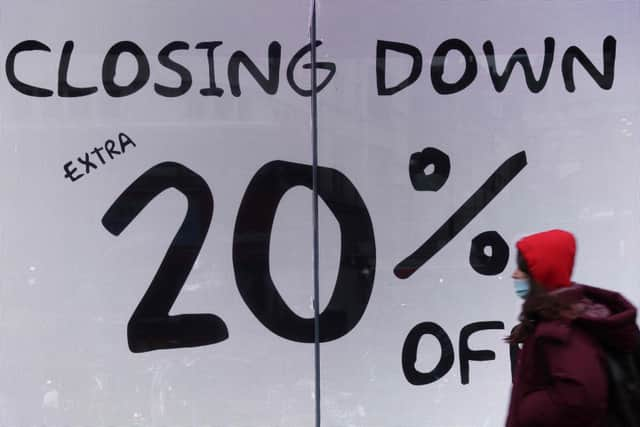Scotland's shop closures near pre-pandemic levels, says PwC
New data shows the first half of 2022 saw a total of 2,258 net closures – the number of closures less the number of openings – of physical businesses outlets (as opposed to online shops), equivalent to 12 per day on average.
The number is the lowest since 2017 and 30 per cent lower than the first half of 2021, according to the latest Store Openings and Closures report published by professional services firm PwC. The report used data on multiple retail operators, specifically those with five or more outlets nationally.
Advertisement
Hide AdAdvertisement
Hide AdScotland’s total net closures reached 180, with 536 closures and 356 openings, down from 436 net closures in the first half of 2021, and just ahead of the 176 seen in the first six months of 2019.
Lisa Hooker, industry leader for consumer markets at PwC UK, said the figure gave "some reason for optimism" but positivity came with "significant concerns" over the rising cost of living and the impact on consumer spending.
She said: "While the outlook is better than it was during the height of the pandemic, it's worth noting that the numbers still show a decline, with our net numbers equating to 12 closures a day in the first half of this year.
"Added to that, retail footfall remains 10 to 15 per cent below pre-pandemic levels and openings lack momentum, particularly outside leisure.


"With soaring prices for food, petrol and utility bills, inflation at a 40-year high and the Bank of England warning the UK will fall into a prolonged recession at the end of this year, this will impact everyone, and is only expected to deepen."
While openings across the UK have yet to recover to pre-pandemic rates, leisure businesses like takeaways, restaurants, amusement arcades, and DIY businesses (boosted by home improvement trends formed during lockdowns) are leading the recovery, PwC said.
While restaurants have seen some of the worst performance over the past three years, the report said they have been taking advantage of lower rents and vacant spaces. The number of amusement arcades has also shown growth for the same reasons.
Changing landscape
Banks and financial services saw net closures of 199 in the first half of 2022, matched by the number of charity shops that closed their doors. Betting shops saw 226 net closures, a decline the report largely put down to legislative changes, and fashion retailers saw 128 net closures, but this was significantly lower than previous years.
Advertisement
Hide AdAdvertisement
Hide AdThe report outlines how closures have been accelerating since the mid 2010s, fuelled largely by a shift to online services, and the pandemic brought a shake-out of over-expanded businesses like restaurant chains or fashion retailers.
It comes after the Scottish Retail Consortium last month said the overall vacancy rate on Scotland’s high streets decreased to 15.7 per cent in the second quarter of 2022 from 15.8 per cent in the first.
However, the trade body said Scotland’s vacancy rate remains above that for the rest of the UK, while more recently it said shopkeepers faced a “bitter winter” after sales flatlined.
Comments
Want to join the conversation? Please or to comment on this article.
